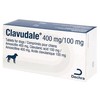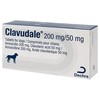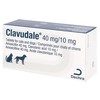Clavudale
Clavudale Tablets are for the treatment of bacterial infections in cats and dogs susceptible to amoxicillin in combination with clavulanic acid, such as skin infections, infections of the oral cavity, urinary tract infections, respiratory tract infections, and gastrointestinal infections.
Clavudale Tablets are pink, oblong shaped tablets with a meat flavour for palatability. They have been scored so that they can be broken into halves for easy and accurate dosing.
Clavudale 400mg/100mg Tablets for Dogs
£1.79Clavudale 400mg/100mg Tablets are indicated for the treatment of bacterial infections susceptible to amoxicillin in combination with clavulanic acid where clinical experience and/or...[More info]
Clavudale 200mg/50mg Tablets for Dogs
£0.94Clavudale 200mg/50mg Tablets are indicated for the treatment of bacterial infections susceptible to amoxicillin in combination with clavulanic acid where clinical experience and/or...[More info]
Clavudale 40mg/10mg Tablets for Cats and Dogs
£0.41Clavudale 40mg/10mg Tablets are indicated for the treatment of bacterial infections susceptible to amoxicillin in combination with clavulanic acid where clinical experience and/or...[More info]
Contraindications
Do not use in cases of hypersensitivity to tetracyclines or to any of the excipients.
Special precautions for use in animals
The product should be administered with caution to animals with dysphagia or diseases accompanied with vomiting, since administration of doxycycline Hyclate tablets has been associated with oesophageal erosion.
In order to reduce the likelihood of oesophageal irritation as well as other gastrointestinal side effects, the product should be administered together with food.
Special care should be taken when administering the product to animals with liver disease, since increases in hepatic enzymes have been documented in some animals after doxycycline treatment.
The product should be administered with caution to young animals, since tetracyclines as a class may cause permanent discolouration of the teeth, when administered during tooth development. However, human literature indicates that doxycycline is less likely than other tetracyclines to cause these abnormalities, due to its reduced ability to chelate calcium.
Due to the likely variability (time, geographical) in the occurrence of resistance of bacteria for doxycycline, bacteriological sampling and susceptibility testing are recommended. Official, national and regional antimicrobial policies should be taken into account when the product is used. Use of the product deviating from the instructions given in this datasheet may increase the prevalence of bacteria resistant to doxycycline and may decrease the effectiveness of treatment with other tetracyclines, due to the potential for cross-resistance.
Special precautions to be taken by the person administering the veterinary medicinal product to animals
Tetracyclines may cause hypersensitivity (allergy) reactions.
People with known hypersensitivity to tetracyclines should avoid contact with the veterinary medicinal product.
Wash hands after use.
If you develop symptoms following exposure such as skin rash, seek medical advice immediately and show the package leaflet to the physician.
Doxycycline may cause gastrointestinal disturbances after accidental ingestion, especially by children. To avoid accidental ingestion, particularly by a child, unused tablet parts should be returned to the open blister space and inserted back into the carton. In case of accidental ingestion, particularly by children, seek medical advice.
Adverse reactions
Gastrointestinal disorders such as vomiting, diarrhoea and oesophagitis have been reported as side effects following doxycycline therapy.
In very young animals discolouration of the teeth may occur by the formation of a tetracycline-calcium phosphate complex.
Hypersensitivity reactions, photosensitivity and in exceptional cases photodermatitis may occur after exposure to intense daylight.
Retardation of skeletal growth of young animals (reversible upon discontinuation of therapy) is known to occur with use of other tetracyclines and might occur following administration of doxycycline.
Use during pregnancy and lactation
The safety of the veterinary medicinal product has not been established during pregnancy and lactation. Tetracyclines as a class can retard foetal skeletal development (fully reversible) and cause discolouration of the deciduous teeth. However, evidence from human literature suggests that doxycycline is less likely to cause these abnormalities than other tetracyclines. Use only according to the benefit/risk assessment by the responsible veterinarian.
Interactions
Do not administer concurrently with bactericidal antibiotics such as penicillin's and cephalosporins. Oral absorbents and substances containing multivalent cations such as antacids and iron salts should not be used from 3 hours before to 3 hours after the administration of doxycycline. The half-life of doxycycline is reduced by concurrent administration of antiepileptic drugs such as phenobarbital and phenytoin.
Amounts to be administered and administration route
Oral use.
The recommended dose for dogs and cats is 10 mg doxycycline per kg body weight per day. The majority of routine cases are expected to respond after between 5 and 7 days of therapy. Therapy should continue for 2-3 days beyond the clinical cure for acute infections. In chronic or refractory cases, a longer course of therapy, up to 14 days, may be required. In dogs with interstitial nephritis due to leptospirosis, treatment for 14 days is recommended. In cats with C. felis infections, it is recommended to administer treatment for a minimum period of 28 days in order to ensure elimination of the organism. To ensure a correct dosage body weight should be determined as accurately as possible to avoid underdosing. Tablets should be administered together with the food (see Special precautions for use in animals).
Tablets can be divided into 2 or 4 equal parts to ensure accurate dosing. Place the tablet on a flat surface, with its scored side facing up and the convex (rounded) side facing the surface.
2 equal parts: press down with your thumbs on both sides of the tablet.
4 equal parts: press down with your thumb in the middle of the tablet.
Overdose
In cases of overdose no symptoms are to be expected other than those mentioned in Adverse reactions.


